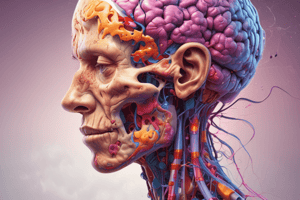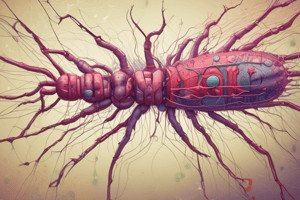Podcast
Questions and Answers
What is the function of keratin in the skin?
What is the function of keratin in the skin?
- Provides sensation and blood supply to the skin
- Sloughs off dead cells in the epidermis
- Waterproofs the skin and protects from microbial invasion (correct)
- Aids in the production of sebum and lysozyme
Which layer of the skin contains nerves, blood vessels, and lymphatic vessels?
Which layer of the skin contains nerves, blood vessels, and lymphatic vessels?
- Epidermis
- Dermis (correct)
- Stratum corneum
- Subcutaneous layer
What is the most common skin disorder mentioned in the text?
What is the most common skin disorder mentioned in the text?
- Cellulitis
- Warts
- Impetigo
- Acne (correct)
What is the purpose of good skin hygiene in preventing acne?
What is the purpose of good skin hygiene in preventing acne?
What is the most common cause of acne development?
What is the most common cause of acne development?
What is the cause of cold sores and fever blisters?
What is the cause of cold sores and fever blisters?
Which bacterium is responsible for causing boils and furuncles?
Which bacterium is responsible for causing boils and furuncles?
What can lead to the reactivation of herpes simplex virus?
What can lead to the reactivation of herpes simplex virus?
What are the causative agents of impetigo?
What are the causative agents of impetigo?
What causes scalded skin syndrome?
What causes scalded skin syndrome?
How was smallpox eradicated?
How was smallpox eradicated?
What is the recommended method for preventing herpes?
What is the recommended method for preventing herpes?
Which bacterium is responsible for causing necrotizing fasciitis?
Which bacterium is responsible for causing necrotizing fasciitis?
What causes Cat Scratch Disease?
What causes Cat Scratch Disease?
What is the most effective way to prevent measles?
What is the most effective way to prevent measles?
Which bacterium is responsible for Pseudomonas Infection?
Which bacterium is responsible for Pseudomonas Infection?
What virus causes rubella, or German measles?
What virus causes rubella, or German measles?
What causes Gas Gangrene?
What causes Gas Gangrene?
How are warts caused?
How are warts caused?
What is the causative agent of Leprosy?
What is the causative agent of Leprosy?
What is the cause of tinea corporis, capitis, cruris, and pedis?
What is the cause of tinea corporis, capitis, cruris, and pedis?
What causes Chickenpox?
What causes Chickenpox?
What causes leishmaniasis?
What causes leishmaniasis?
What causes Shingles?
What causes Shingles?
What is the main defense of the eye?
What is the main defense of the eye?
What is the primary method for preventing chickenpox and shingles?
What is the primary method for preventing chickenpox and shingles?
What are the symptoms of conjunctivitis, or 'pink eye'?
What are the symptoms of conjunctivitis, or 'pink eye'?
Which disease is caused by abnormal prions and presents symptoms including insomnia, weight loss, and memory failure?
Which disease is caused by abnormal prions and presents symptoms including insomnia, weight loss, and memory failure?
Which disease is transmitted through contact with infected body fluids and can lead to symptoms varying from anxiety and nervousness to coma and death?
Which disease is transmitted through contact with infected body fluids and can lead to symptoms varying from anxiety and nervousness to coma and death?
Which disease can result in asymptomatic infections, minor polio, nonparalytic polio, or paralytic polio, and is transmitted through the fecal-oral route?
Which disease can result in asymptomatic infections, minor polio, nonparalytic polio, or paralytic polio, and is transmitted through the fecal-oral route?
Which disease leads to symptoms such as extreme arching of the back, muscle spasms, and rigid paralysis, often resulting in death?
Which disease leads to symptoms such as extreme arching of the back, muscle spasms, and rigid paralysis, often resulting in death?
Which disease can be foodborne, infant, or wound-related, and presents symptoms including double vision, difficulty swallowing, and descending muscular paralysis?
Which disease can be foodborne, infant, or wound-related, and presents symptoms including double vision, difficulty swallowing, and descending muscular paralysis?
Which disease is caused by Trypanosoma brucei and is transmitted by the Tse Tse fly in equatorial Africa, leading to fever, malaise, and eventually coma and death?
Which disease is caused by Trypanosoma brucei and is transmitted by the Tse Tse fly in equatorial Africa, leading to fever, malaise, and eventually coma and death?
Which disease is caused by Acanthamoeba and Naegleria, entering the host through skin abrasions or inhalation of contaminated water, and leading to symptoms similar to those of meningitis and encephalitis?
Which disease is caused by Acanthamoeba and Naegleria, entering the host through skin abrasions or inhalation of contaminated water, and leading to symptoms similar to those of meningitis and encephalitis?
How is Variant Creutzfeldt-Jakob Disease diagnosed?
How is Variant Creutzfeldt-Jakob Disease diagnosed?
What is the key method for preventing poliomyelitis?
What is the key method for preventing poliomyelitis?
How can botulism be prevented?
How can botulism be prevented?
What is a characteristic symptom of rabies?
What is a characteristic symptom of rabies?
What is the mode of transmission for African Trypanosomiasis?
What is the mode of transmission for African Trypanosomiasis?
What is the main cause of otitis media?
What is the main cause of otitis media?
How is bacterial meningitis primarily transmitted to the central nervous system?
How is bacterial meningitis primarily transmitted to the central nervous system?
What are the typical symptoms of bacterial meningitis?
What are the typical symptoms of bacterial meningitis?
Which bacterial species can cause diseases of the nervous system?
Which bacterial species can cause diseases of the nervous system?
What is the primary prevention method for arboviral encephalitis?
What is the primary prevention method for arboviral encephalitis?
What is the characteristic of prion diseases?
What is the characteristic of prion diseases?
What is the treatment for viral forms of meningitis?
What is the treatment for viral forms of meningitis?
What is the most severe form of bacterial meningitis?
What is the most severe form of bacterial meningitis?
What is the role of tubes in the treatment of otitis media in kids?
What is the role of tubes in the treatment of otitis media in kids?
What is the primary route of transmission for arboviruses?
What is the primary route of transmission for arboviruses?
What is the characteristic of subacute encephalitis?
What is the characteristic of subacute encephalitis?
How are viral forms of meningitis different from bacterial forms in terms of duration?
How are viral forms of meningitis different from bacterial forms in terms of duration?
Study Notes
Infectious Diseases Affecting the Nervous System
- Otitis media is often associated with ear and respiratory infections, and can be caused by a variety of bacteria such as S. pneumoniae, S. pyogenes, and S. aureus.
- Treatment for otitis media includes antibiotic therapy and tubes for kids.
- The central nervous system (CNS) consists of the brain, spinal cord, and neurons, which are surrounded by defenses such as meninges, cerebrospinal fluid, and the blood-brain barrier.
- The CNS is an axenic environment, devoid of normal microbiota, but pathogens may access it through breaks in the bones and meninges, medical procedures, or traveling in peripheral neurons.
- Nervous system diseases include meningitis, encephalitis, rabies, poliomyelitis, tetanus, botulism, and African sleeping sickness.
- Bacterial diseases of the nervous system, such as meningitis, can be caused by Neisseria meningitidis, Streptococcus pneumoniae, Haemophilus influenzae, Listeria monocytogenes, and Streptococcus agalactiae, as well as various fungi and viruses.
- Bacterial meningitis presents with acute onset of fever, headache, painful or stiff neck, increased white blood cells in CSF, and confused or disturbed brain function.
- The most severe form, meningococcal meningitis, is associated with epidemic forms and can lead to petechiae, ecchymosis, shock, and coma, with a 15% mortality rate for treated cases.
- Viral forms of meningitis are generally milder and usually resolve in 2 weeks, with prevention through good hygiene and no specific treatment.
- Arboviruses, transmitted by blood-sucking arthropods, can cause arboviral encephalitis, with prevention involving limiting contact with mosquitoes and vaccines available for horses.
- Subacute encephalitis is mostly a protozoan infection, while prion diseases, caused by infectious proteins, include spongiform encephalopathies such as scrapie and mad cow disease.
- Prion diseases leave the brains of victims full of holes and can be contracted by eating meat from infected cattle.
Studying That Suits You
Use AI to generate personalized quizzes and flashcards to suit your learning preferences.
Related Documents
Description
Test your knowledge of infectious diseases affecting the nervous system with this quiz. Explore the causes, symptoms, and treatments of conditions such as otitis media, meningitis, encephalitis, rabies, poliomyelitis, tetanus, botulism, and African sleeping sickness. Learn about the bacteria, viruses, fungi, and other pathogens that can impact the central nervous system, and understand the preventive measures and treatments available for these diseases.




